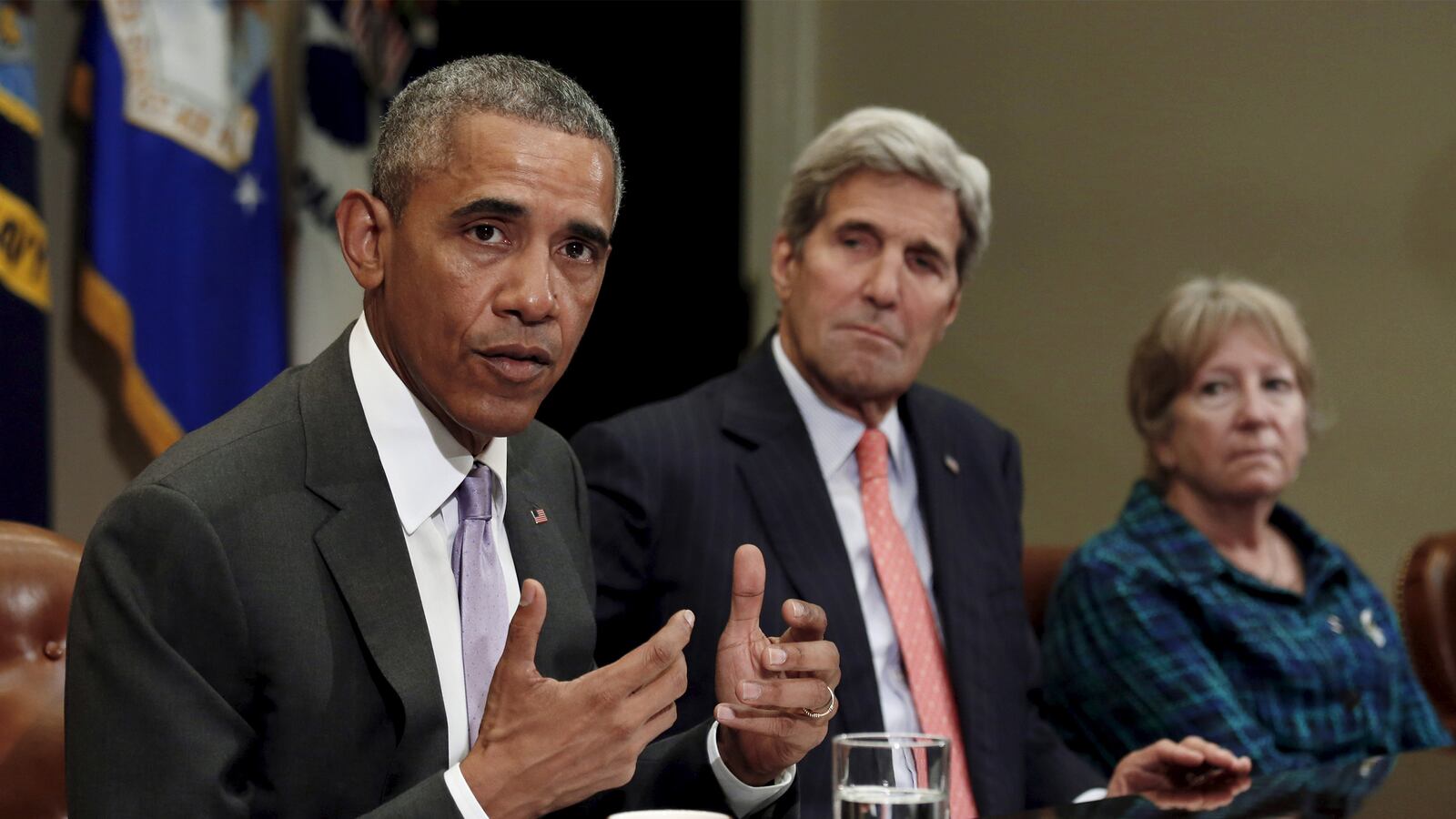A strange thing happened once Democrats secured enough votes in Congress to ensure survival of President Obama’s landmark Iran nuclear deal: a major escalation of aggressive war talk directed at the Islamic Republic.
And not just from Dick Cheney. Or Democrats who opposed the deal. But from Democrats who formally support the Joint Comprehensive Plan of Action (JCPOA).
Senator Bob Casey of Pennsylvania, for example, says the deal failed to compel Iran to “forgo its intention to develop nuclear weapons,” and that the only way to “prevent or destroy [the] Iranian nuclear threat” is a “credible threat of a U.S. military strike to destroy any Iranian nuclear weapons infrastructure completely.”
Senator Joe Donnelly of Indiana lamented that the deal has likely not forestalled the day “when we are left with no alternative but to take military action to prevent Iran from crossing the nuclear threshold.” Connecticut Senator Richard Blumenthal agrees—and says he supports the agreement so that if and when military force is needed, the United States will not act alone, but with “a coalition of allies and partners.”
Democratic presidential candidate Hillary Clinton takes it one step further, calling for a new “declaratory policy” by the United States that it will “not hesitate to take military action” if Iran violates its commitments or is seen as working toward a bomb.
There is, of course, nothing wrong with backing up diplomacy with threats, or even use of force. Frederick the Great memorably explained that “Diplomacy without arms is like music without instruments.”
What is unusual here is that all of this sabre-rattling is coming after the deal has been reached, rather than before, or during, negotiations. Which only confirms what many critics of the Iran nuclear deal already have intimated: that unlike Frederick the Great, or even George W. Bush, Barack Obama’s diplomacy was never backed by a credible use of force. Or to put it the way the president himself might, all options were never on the table.
Consider for a moment where Iran was at the start of the secret negotiations in 2012.
The Iranian regime had just emerged from a major political crisis, the so-called Green Movement uprisings. And its economy was in tatters, partly a result of gross mismanagement, partly a result of new congressionally imposed sanctions. In the region, the Arab Spring was gearing up, and not necessarily turning to Iran’s advantage.
Tehran’s only Arab ally, Syrian dictator Bashar al-Assad, faced an existential crisis. Sunni Islamists from Egypt to Libya to Yemen were gaining in strength, and the Islamic Republic looked increasingly isolated.
Iran, in short, was on the ropes—politically, economically, and diplomatically. And it was then that Tehran began hinting it was finally ready to consider relief from sanctions in return for major concessions on its nuclear program. In other words, the United States was in a prime negotiating position.
The language out of the White House at the time was that the United States was willing to trade the dismantling of sanctions for the dismantling of Iran’s nuclear program, or as John Kerry put it in 2013, the goal of “imposing these sanctions” was to get Iran to “dismantle its nuclear program.”
Well, not quite. Rather, the goal of imposing those sanctions was, we know now, for Iran to keep its entire nuclear infrastructure, but mothball a few thousand centrifuges and the core of its plutonium reactor for a decade.
In fact, the JCPOA took an Iran that was on the ropes and pulled it off of them—to the tune of more than $150 billion in immediate sanctions relief. To hear the deal’s proponents tell it, this leaves us in a much better, safer place than we were a year ago. A safer place, it should be noted, that apparently demands billions in new arms sales from the United States to Iran’s neighbors. A safer place where the very proponents of a new “opening” with Iran are now leading the charge to flex America’s muscles and issue new threats of war.
The question is, why, now, are any such threats credible?
Consider that while President Obama insisted at every juncture that “all options are on the table” vis-à-vis Iran, he ignored the aggressive escalation of the Iranian nuclear program; a dramatic jump in Iranian support for terrorist groups, including the insertion of its proxy Hezbollah into the Syrian war to defend Assad; and its meddling from Yemen to Gaza to Bahrain in order to destabilize the region.
Also consider that in response to the use of chemical weapons by Iranian proxy Assad, something the President publically warned was a “red line” for him, Mr. Obama famously backed down on his threat to launch military strikes. Indeed, not only were all military options not on the table, even coercive economic measures were anathema to the Obama White House. Notwithstanding ex post facto efforts of both Mr. Obama and Mrs. Clinton to take credit, both staunchly opposed bipartisan Congressional moves to tighten sanctions against Iran over the past five years.
So now, recognizing that one of the main byproducts of the JCPOA is a newly empowered Iran, a group of erstwhile Democratic doves are seeking to restore American credibility. Unfortunately, as Tehran figured out some time ago, their threats are empty, American deterrence is in tatters, and even though this time they say they really, really mean it, in fact most options for this administration will remain off the table. Music without instruments, sound and fury signifying nothing.
Stuart Gottlieb teaches American foreign policy and international security at Columbia University. Danielle Pletka is senior vice president for foreign and defense policy studies at the American Enterprise Institute.





